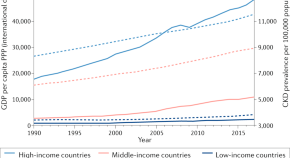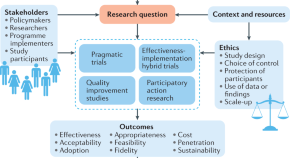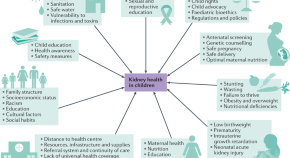Sustainable Development Goals and kidney disease (original) (raw)
Review
Sustainable Development Goals relevant to kidney health: an update on progress
Working towards sustainable development is essential to tackle the rise in the global burden of non-communicable diseases, including kidney disease. Five years after the Sustainable Development Goal agenda was set, this Review examines the progress thus far, highlighting future challenges and opportunities, and explores the implications for kidney disease.
Chronic kidney disease (CKD) is a rapidly growing public health problem, especially in disadvantaged populations. Major political interventions are required to mitigate the social and socioeconomic inequities that contribute to the development and progression of CKD and its disproportionate impact on low and middle-income countries.
- M. R. Moosa
- K. C. Norris

Kidney health in the context of economic development
The coronavirus disease 2019 global pandemic has disrupted every economy in the world. Now, more than ever, universal health coverage is needed to protect the world’s most vulnerable individuals, who are not only at very high risk of virus-related disability or death but also of falling into poverty owing to catastrophic health-care spending.
- Rachael L. Morton
- Karan K. Shah
Towards sustainable environmental development in nephrology care, research and education
Health-care professionals in general and nephrologists in particular can and should make clear contributions towards achieving the Sustainable Development Goals. This commitment will require changes in patient care, research and education, which should be carried out in collaboration with relevant stakeholders, such as health-care industries.
- Peter J. Blankestijn
Dispelling the myths of providing dialysis in low- and middle-income countries
Public policy for kidney replacement therapy eludes most low- and middle-income countries owing to the seemingly low number of cases and high cost. Countries such as Thailand have shown that public health authorities can effectively provide treatment and elevate health care for populations by overcoming some common challenges.
- Yot Teerawattananon
- Kriang Tungsanga
- Saudamini Dabak

Change and choice: research and evidence-informed policy
Progress towards the Sustainable Development Goals depends on population health in all countries. Implementation research is crucial for generating evidence on how to sustainably embed effective clinical interventions in health systems and local delivery mechanisms, thereby improving their likelihood of success, and informing policy change to improve population health.
- Vivekanand Jha
- Dwomoa Adu
